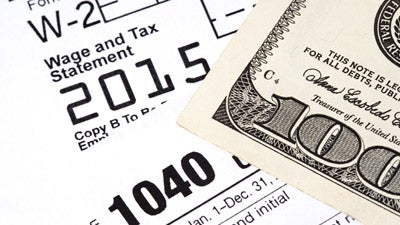Home > Finance > Tax and Accounting >
6 Things You Can Do This Fall to Prepare for the 2015 Tax Season
By: 1800Accountant

Fall has finally arrived. Believe it or not, this means the 2015 tax season is only about 3 months away. Because filing your taxes with the IRS is probably not your most favorite activity, there are some steps you can take this fall to prepare for a stress-free filing season early next year:
1. Determine if your filing status will change from this year.
Did you get married this year? Do you have a baby on the way soon? If you’ve had any big life changes in 2014 or plan to before New Year’s Eve, your tax-filing status with the IRS could change for the 2015 tax season. That’s because you may be able to file a joint return with your new spouse. Or you might be able to claim your newborn as a dependent. If no drastic changes have taken place in your life this year, you likely don’t have to worry about doing anything differently when filing your taxes in the spring.
2. Get your tax documents and receipts in order.
In addition to submitting a regular tax return to the IRS like Form 1040, you might need to have receipts or other statements handy. This is because the IRS wants taxpayers to prove to them that they legitimately deserve various tax deductions or tax credits they claim on their returns. So create a file folder with all of your tax-related documents so that you know where they are and can easily access them when the time comes. It’s also helpful to scan this information and maintain a copy of it on your computer, tablet, or smartphone. Just make sure it is completely password-protected.
3. Decide how you’re going to file.
Before the 2015 tax season arrives, make up your mind on how you’ll be filing your taxes with the IRS. Will you do them yourself? Will you consult an accounting firm to ensure you’re playing by all the rules and taking advantage of your eligible tax-saving opportunities? Will you utilize the services of a tax prepare? Making this decision now will make for a much easier filing experience in the near future.
4. Make some basic calculations on your tax situation.
Even if you weren’t a math major in college, and your uncle isn’t a calculus professor, there are some simple ways to calculate whether or not you’ll owe Uncle Sam—or you’ll be getting a tax refund. This can be done by looking at how much income you’ve made in 2014, how many tax deductions or credits you can claim, and what your income tax rate is. If you are a small business owner, this calculation could get a little complicated. But individual taxpayers should be able to get a good gauge on what their situation will be ahead of time using basic addition and multiplication.
5. Set some money aside.
While you may not owe anything in taxes next year, it’s smart to set aside some money in case you do. The last thing you’d want is to get an IRS bill, not be able to afford it, and then get hit with late-filing or late-payment penalties from the IRS. Saving money is a wise practice anyway.
6. Learn about any new deductions or credits you qualify for.
Not only do tax deductions and tax credits change from year to year, but also you might qualify for some of these tax-saving strategies now that you were not eligible for in the past. For example, perhaps you had a baby this year and can now claim the child tax credit. Or you started your own business, and you can now claim the home office deduction or the vehicle deduction for business use of your car. You certainly don’t want to walk away from the opportunities to keep more of your hard-earned money. Plus, researching these deductions and credits now will ensure you are all set with each and every one that you deserve instead of rushing to make these determinations when time is short.
This article was originally published by 1800 Accountant
Published: October 17, 2014
2125 Views
2125 Views












